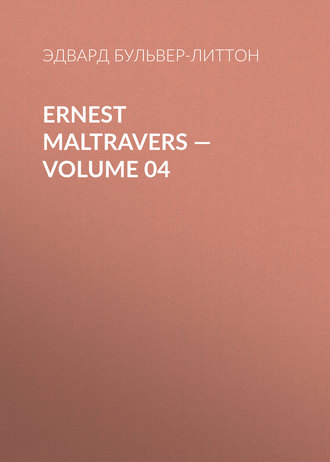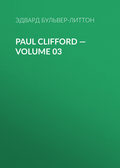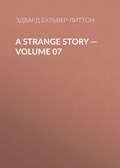
Эдвард Бульвер-Литтон
Ernest Maltravers — Volume 04
"Look you, Darvil," said the banker, summoning up all his energy and intellect, for his moral power began now to back his physical cowardice, and he spoke calmly, and even bravely, though his heart throbbed aloud against his breast, and you might have knocked him down with a feather—"the London runners are even now hot after you."
"Ha!—you lie!"
"Upon my honour I speak the truth; I heard the news last evening. They tracked you to C———; they tracked you out of the town; a word from me would have given you into their hands. I said nothing—you are safe—you may yet escape. I will even help you to fly the country, and live out your natural date of years, secure and in peace."
"You did not say that the other day in the snug drawing-room; you see I have the best of it now—own that."
"I do," said the banker.
Darvil chuckled, and rubbed his hands.
The man of wealth once more felt his importance, and went on. "This is one side of the question. On the other, suppose you rob and murder me, do you think my death will lessen the heat of the pursuit against you? The whole country will be in arms, and before forty-eight hours are over you will be hunted down like a mad dog."
Darvil was silent, as if in thought; and after a pause, replied: "Well, you are a 'cute one after all. What have you got about you? you know you drove a hard bargain the other day—now it's my market—fustian has riz—kersey has fell."
"All I have about me shall be yours," said the banker, eagerly.
"Give it me, then."
"There!" said the banker, placing his purse and pocketbook into Darvil's bands.
"And the watch?"
"The watch?—well there!"
"What's that?"
The banker's senses were sharpened by fear, but they were not so sharp as those of Darvil; he heard nothing but the rain pattering on the leaves, and the rush of water in the ditch at hand. Darvil stooped and listened—till, raising himself again, with a deep-drawn breath, he said, "I think there are rats in the haystack; they will be running over me in my sleep; but they are playful creturs, and I like 'em. And now, my /dear/ sir, I am afraid I must put an end to you!"
"Good Heavens, what do you mean? How?"
"Man, there is another world!" quoth the ruffian, mimicking the banker's solemn tone in their former interview. "So much the better for you! In that world they don't tell tales."
"I swear I will never betray you."
"You do?—swear it, then."
"By all my hopes of earth and heaven!"
"What a d——-d coward you be!" said Darvil, laughing scornfully. "Go—you are safe. I am in good humour with myself again. I crow over you, for no man can make me tremble. And villain as you think me, while you fear me you cannot despise—you respect me. Go, I say—go."
The banker was about to obey, when suddenly, from the haystack, a broad, red light streamed upon the pair, and the next moment Darvil was seized from behind, and struggling in the gripe of a man nearly as powerful as himself. The light, which came from a dark-lanthorn, placed on the ground, revealed the forms of a peasant in a smock-frock, and two stout-built, stalwart men, armed with pistols—besides the one engaged with Darvil.
The whole of this scene was brought as by the trick of the stage— as by a flash of lightning—as by the change of a showman's phantasmagoria—before the astonished eyes of the banker. He stood arrested and spell-bound, his hand on his bridle, his foot on his stirrup. A moment more and Darvil had clashed his antagonist on the ground; he stood at a little distance, his face reddened by the glare of the lanthorn and fronting his assailants—that fiercest of all beasts, a desperate man at bay! He had already succeeded in drawing forth his pistols, and he held one in each hand—his eyes flashing from beneath his bent brows and turning quickly from foe to foe! At last those terrible eyes rested on the late reluctant companion of his solitude.
"So /you/ then betrayed me," he said, very slowly, and directed his pistol to the head of the dismounted horseman.
"No, no!" cried one of the officers, for such were Darvil's assailants; "fire away in this direction, my hearty—we're paid for it. The gentleman knew nothing at all about it."
"Nothing, by G—!" cried the banker, startled out of his sanctity.
"Then I shall keep my shot," said Darvil; "and mind, the first who approaches me is a dead man."
It so happened that the robber and the officers were beyond the distance which allows sure mark for a pistol-shot, and each party felt the necessity of caution.
"Your time is up, my swell cove!" cried the head of the detachment; "you have had your swing, and a long one it seems to have been—you must now give in. Throw down your barkers, or we must make mutton of you, and rob the gallows."
Darvil did not reply, and the officers, accustomed to hold life cheap, moved on towards him—their pistols cocked and levelled.
Darvil fired—one of the men staggered and fell. With a kind of instinct Darvil had singled out the one with whom he had before wrestled for life. The ruffian waited not for the others—he turned and fled along the fields.
"Zounds, he is off!" cried the other two, and they rushed after him in pursuit. A pause—a shot—another—an oath—a groan—and all was still.
"It's all up with him now," said one of the runners, in the distance; "he dies game."
At these words, the peasant, who had before skulked behind the haystack, seized the lanthorn from the ground, and ran to the spot. The banker involuntarily followed.
There lay Luke Darvil on the grass—still living, but a horrible and ghastly spectacle. One ball had pierced his breast, another had shot away his jaw. His eyes rolled fearfully, and he tore up the grass with his hands.
The officers looked coldly on. "He was a clever fellow!" said one.
"And has given us much trouble," said the other; "let us see to Will."
"But he's not dead yet," said the banker, shuddering.
"Sir, he cannot live a minute."
Darvil raised himself bolt upright—shook his clenched fist at his conquerors, and a fearful gurgling howl, which the nature of his wounds did not allow him to syllable into a curse, came from his breast—with that he fell flat on his back—a corpse.
"I am afraid, sir," said the elder officer, turning away, you had a narrow escape—but how came you here?"
"Rather, how came /you/ here?"
"Honest Hodge there, with the lanthorn, had marked the fellow skulk behind the haystack, when he himself was going out to snare rabbits. He had seen our advertisement of Watts' person, and knew that we were then at a public house some miles off. He came to us—conducted us to the spot—we heard voices—showed up the glim—and saw our man. Hodge, you are a good subject, and love justice."
"Yees, but I shall have the rewourd," said Hodge, showing his teeth.
"Talk o' that by and by," said the officer. "Will, how are you, man?"
"Bad," groaned the poor runner, and a rush of blood from the lips followed the groan.
It was many days before the ex-member for C——— sufficiently recovered the tone of his mind to think further of Alice; when he did, it was with great satisfaction that he reflected that Darvil was no more, and that the deceased ruffian was only known to the neighbourhood by the name of Peter Watts.







